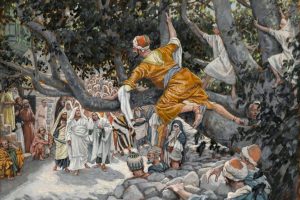Tuesday of the 33rd Week in Ordinary Time
 November 16, 2021
November 16, 2021
First Reading: 2 Maccabees 6:18-31
18 Eleazar, one of the scribes in high position, a man now advanced in age and of noble presence, was being forced to open his mouth to eat swine’s flesh. 19 But he, welcoming death with honor rather than life with pollution, went up to the rack of his own accord, spitting out the flesh, 20 as men ought to go who have the courage to refuse things that it is not right to taste, even for the natural love of life. 21 Those who were in charge of that unlawful sacrifice took the man aside, because of their long acquaintance with him, and privately urged him to bring meat of his own providing, proper for him to use, and pretend that he was eating the flesh of the sacrificial meal which had been commanded by the king, 22 so that by doing this he might be saved from death, and be treated kindly on account of his old friendship with them. 23 But making a high resolve, worthy of his years and the dignity of his old age and the gray hairs which he had reached with distinction and his excellent life even from childhood, and moreover according to the holy God-given law, he declared himself quickly, telling them to send him to Hades. 24 “Such pretense is not worthy of our time of life,” he said, “lest many of the young should suppose that Eleazar in his ninetieth year has gone over to an alien religion, 25 and through my pretense, for the sake of living a brief moment longer, they should be led astray because of me, while I defile and disgrace my old age. 26 For even if for the present I should avoid the punishment of men, yet whether I live or die I shall not escape the hands of the Almighty. 27 Therefore, by manfully giving up my life now, I will show myself worthy of my old age 28 and leave to the young a noble example of how to die a good death willingly and nobly for the revered and holy laws.” When he had said this, he went at once to the rack. 29 And those who a little before had acted toward him with good will now changed to ill will, because the words he had uttered were in their opinion sheer madness. 30 When he was about to die under the blows, he groaned aloud and said: “It is clear to the Lord in his holy knowledge that, though I might have been saved from death, I am enduring terrible sufferings in my body under this beating, but in my soul I am glad to suffer these things because I fear him.” 31 So in this way he died, leaving in his death an example of nobility and a memorial of courage, not only to the young but to the great body of his nation.
Reflection for the day: “To be pleased at correction and reproofs shows that one loves the virtues which are contrary to those faults for which he is corrected and reproved. And, therefore, it is a great sign of advancement in perfection.” — St. Francis de Sales


You must be logged in to post a comment.